Found a total of 10000 related content

How do I fix 'Autoload error' after installing packages with Composer?
Article Introduction:When encountering Composer's "Autoloaderror", the first thing to do is to clarify the core of the problem: PHP cannot find the required class through automatic loading. The following are the solutions: 1. Run composerdump-autoload to regenerate the automatic loading file, and clear the cache if necessary; 2. Check whether the case of the class name and file path match, especially on case-sensitive systems; 3. Check the PSR-4 automatic loading configuration in composer.json to ensure that the namespace and directory path are correct; 4. Try to uninstall and reinstall the problem package or clean the vendor directory and then reinstall it; 5. Troubleshoot duplicate class names or conflicting files. In most cases
2025-08-05
comment 0
624

Vue Component Registration: Global vs Local
Article Introduction:Global registration is suitable for common components that are frequently used. After registering the entry file through app.component(), it can be used directly in the entire project, but it will increase the initial loading volume; local registration is suitable for specific components in the module, and needs to be imported and declared in the target component. Loading on demand is conducive to maintenance but cannot be reused across components; local registration is preferred when choosing, unless it is necessary to use it globally, on-demand loading can be combined with automatic registration tools, and pay attention to unified naming and common errors such as spelling, paths, forgetting declarations, etc.
2025-07-07
comment 0
708
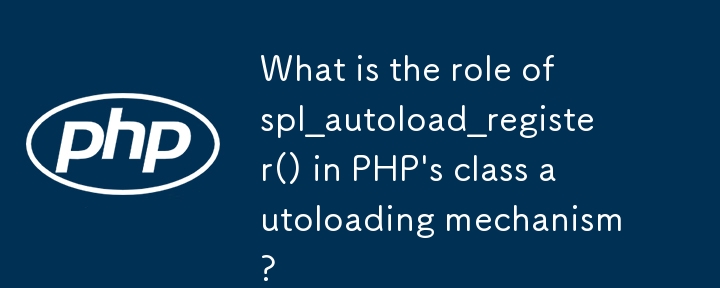
What is the role of spl_autoload_register() in PHP's class autoloading mechanism?
Article Introduction:spl_autoload_register() is a core function used in PHP to implement automatic class loading. It allows developers to define one or more callback functions. When a program tries to use undefined classes, PHP will automatically call these functions to load the corresponding class file. Its main function is to avoid manually introducing class files and improve code organization and maintainability. Use method is to define a function that receives the class name as a parameter, and register the function through spl_autoload_register(), such as functionmyAutoloader($class){require_once'classes/'.$class.'.php';}spl_
2025-06-09
comment 0
413

How do I configure files autoloading in my composer.json file?
Article Introduction:To use Composer to set up automatic loading of PHP projects, you must first edit the composer.json file and select the appropriate automatic loading method. If the most commonly used PSR-4 standard is adopted, the mapping of namespace and directory can be defined in the psr-4 field of autoload, such as mapping MyApp\ to src/directory, so that the MyApp\Controllers\HomeController class will automatically load from src/Controllers/HomeController.php; 1. After the configuration is completed, run composerdumpautoload to generate an automatic loading file; 2. If you need to be compatible with old code, you can use it.
2025-06-19
comment 0
764

How do I handle fatal errors in PHP?
Article Introduction:To handle fatal errors in PHP, it is first necessary to clarify that enabling error reporting and monitoring logs is the key. Secondly, check whether the automatic loading and dependency are correct, such as updating Composer automatic loading, verifying class names and namespaces, and avoiding manual introduction of files; in addition, using the closing function to record fatal error information can improve debug visibility; finally, all errors are displayed during development, and the production environment should record error logs to ensure safety and stability.
2025-06-20
comment 0
960
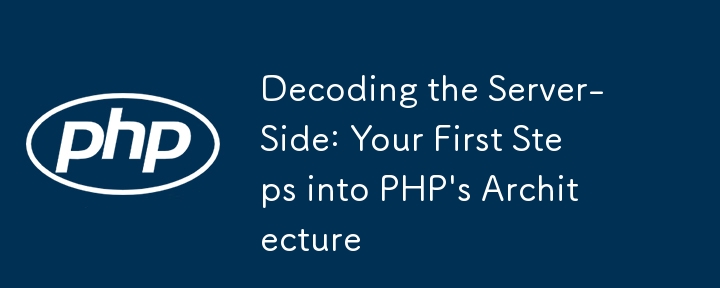
Decoding the Server-Side: Your First Steps into PHP's Architecture
Article Introduction:PHP runs on the server side. When the user requests the page, the server executes the code through the PHP engine and returns HTML to ensure that the PHP code is not seen by the front end. 1. Request processing: Use $_GET, $_POST, $_SESSION, $_SERVER to obtain data, and always verify and filter inputs to ensure security. 2. Separation of logic and display: Separate data processing from HTML output, use PHP files to process logic, and template files are responsible for displaying, improving maintainability. 3. Automatic loading and file structure: Configure PSR-4 automatic loading through Composer, such as "App\":"src/", to automatically introduce class files. Suggested projects
2025-07-27
comment 0
977
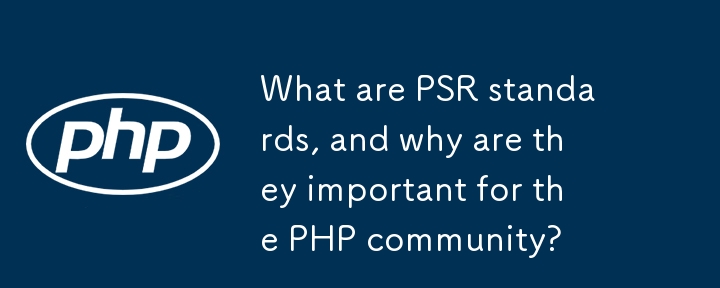
What are PSR standards, and why are they important for the PHP community?
Article Introduction:PSR (PHP Standard Recommendation) is a coding specification formulated by PHP-FIG, aiming to improve compatibility and collaboration efficiency in PHP development. Its core purpose is to make the code between different frameworks and projects easier to read and maintain by unifying code style, structure and automatic loading standards. The main PSRs include: ① PSR-1 basic coding standard; ② PSR-4 automatic loading standard; ③ PSR-12 extended code style guide. Application methods include: ① Use PHPCS or PHP-CS-Fixer for code inspection; ② Set the pre-commit hook to ensure the code is neat; ③ Follow the naming and directory structure specifications; ④ Use PascalCase class name and camelCase method name. Common misunderstandings such as mixing tab characters and empty
2025-06-17
comment 0
330
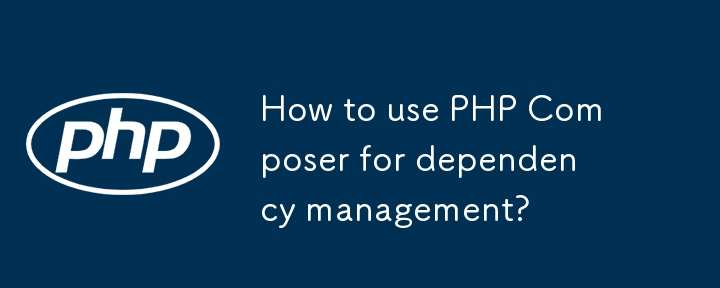
How to use PHP Composer for dependency management?
Article Introduction:Composer solves many problems in PHP dependency management. 1. Install Composer: Windows users use graphical installation programs, Linux/macOS users download and move to the system path through commands; 2. Initialize the project: Run composerinit to create composer.json file; 3. Add dependencies: manually edit the file or use composerrequire command to install the package; 4. Automatic loading: introduce vendor/autoload.php to achieve automatic loading of the class library, and custom classes can be automatically loaded by configuring the autoload field; 5. Update and unload dependencies: use composerupda respectively
2025-07-13
comment 0
716
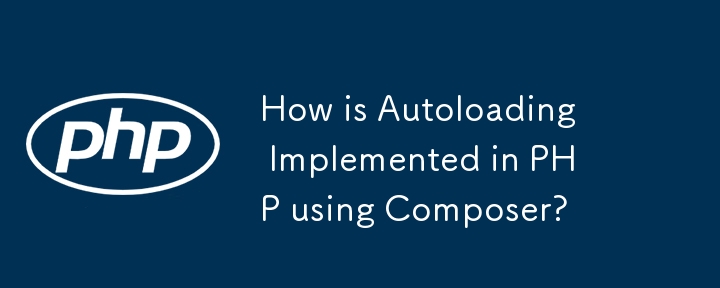
How is Autoloading Implemented in PHP using Composer?
Article Introduction:The core of using Composer to achieve automatic loading is to generate vendor/autoload.php file, and register the spl_autoload_register() callback through the ClassLoader class, and automatically load the class according to the namespace mapping path. 1. Composer generates autoload.php entry file, core class and mapping file according to composer.json configuration; 2. Configure the autoload field to support loading rules such as PSR-4, classmap, files, etc.; 3. ClassLoader converts the class name into a file path and requires the corresponding file; 4. Pay attention to namespace and directory during debugging
2025-07-08
comment 0
410
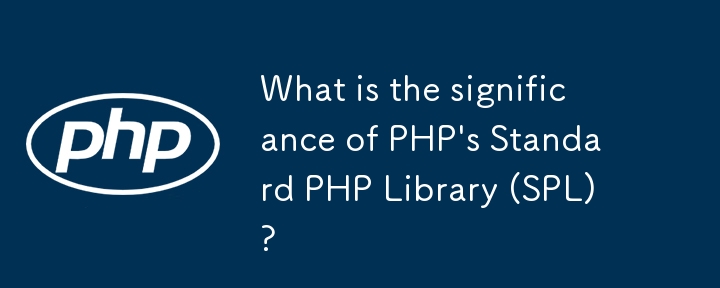
What is the significance of PHP's Standard PHP Library (SPL)?
Article Introduction:PHP's SPL improves code efficiency and maintainability through built-in data structures, iterators, interfaces and automatic loading functions. 1. SPL provides ready-made data structures such as SplStack and SplQueue to save development time and ensure consistency; 2. Built-in iterators such as DirectoryIterator and RecursiveDirectoryIterator simplify file and nested data traversal; 3. Provide interfaces such as IteratorAggregate and ArrayAccess to enhance the array behavior and interoperability of objects; 4. Optimize the class automatic loading mechanism through spl_autoload_register() to reduce redundant code and improve performance
2025-06-14
comment 0
516

How to implement automatic loading of classes in PHP?
Article Introduction:In PHP, automatically loading classes are implemented through the __autoload or spl_autoload_register function. 1. The __autoload function has been abandoned, 2. The spl_autoload_register function is more flexible, supports multiple automatic loading functions, and can handle namespace and performance optimization.
2025-05-15
comment 0
513
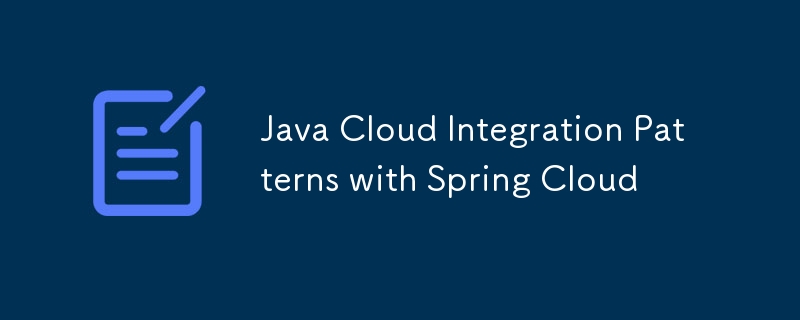
Java Cloud Integration Patterns with Spring Cloud
Article Introduction:Mastering SpringCloud integration model is crucial to building modern distributed systems. 1. Service registration and discovery: Automatic service registration and discovery is realized through Eureka or SpringCloudKubernetes, and load balancing is carried out with Ribbon or LoadBalancer; 2. Configuration center: Use SpringCloudConfig to centrally manage multi-environment configurations, support dynamic loading and encryption processing; 3. API gateway: Use SpringCloudGateway to unify the entry, routing control and permission management, and support current limiting and logging; 4. Distributed link tracking: combine Sleuth and Zipkin to realize the full process of request visual pursuit.
2025-07-27
comment 0
880

What are service providers in Laravel?
Article Introduction:Laravel service providers are used to register and configure core services for applications and third-party packages. 1. The main tasks include binding the class to the service container for automatic parsing; 2. Trigger setting logic such as registration event listening, loading configuration, etc.; 3. Applicable to when building packages, binding multiple related services or global settings; 4. The register() method is used to bind services, and the boot() method is used to perform initialization operations. Understanding its role can better organize the structure of the Laravel project.
2025-07-21
comment 0
539

How to Profile and Tune a Java Application's Startup Time
Article Introduction:First use java-Xlog:startuptime and other JVM flags to measure the startup time, clarify the class loading, GC pause and main() start time; 2. Then use async-profiler or JFR to generate flame graphs to locate hot spots such as Springrefresh() or ClassLoader.defineClass; 3. Optimize for bottlenecks: streamline the dependency and enable CDS to reduce class loading time, configure Spring lazy loading and eliminate useless automatic configuration, avoid running-time resource scanning, and close the C2 compiler or use GraalVMAOT if necessary; 4. Remeasure the verification effect after each adjustment to ensure that the improvement is real and effective - through measurement, analysis, optimization,
2025-07-31
comment 0
923

How do I configure classmap autoloading in my composer.json file?
Article Introduction:To configure the automatic loading of Composer's classmap, first use the "classmap" key under "autoload" in composer.json to specify the directory or file. For example: {"autoload":{"classmap":["lib/","database/models/"]}}, Composer will scan the .php file in these paths and generate class maps. You can also specify a single file such as legacy_class.php. renew
2025-07-14
comment 0
767

What is the composer.json file, and what is its purpose?
Article Introduction:composer.json is a core configuration file required for using Composer in PHP projects, which is used to define dependencies, versions, automatic loading and other settings. It defines project information and requirements through key fields such as name, description, require, require-dev, autoload and scripts, and can be generated through composerinit or manually created or automatically updated through Composer commands such as composerrequire. This file ensures that team members use consistent libraries and versions, supports automatic loading mechanisms, simplifies dependency management and project sharing, and is the cornerstone of building maintainable and deployable PHP projects.
2025-07-21
comment 0
887

The Role of Service Providers in Laravel.
Article Introduction:Service providers are mainly used in Laravel to bind classes to containers and trigger startup logic. Its core responsibilities are divided into two parts: the registration stage is used to bind the class to the service container, which is suitable for simple dependency binding; the boot stage is executed after all service providers have completed registration, which is suitable for operations that need to rely on other services, such as registration middleware, event listening, etc. Create custom service providers can be generated through the Artisan command and registered in the configuration. Common uses include binding interface implementation, loading configuration files, registering middleware and initializing third-party packages. When using it, you should pay attention to avoid calling uninitialized services in the register, make rational use of the automatic discovery mechanism, and maintain the responsibilities of multiple service providers.
2025-07-23
comment 0
198

Resolving Path Ambiguity in Complex Applications with __DIR__
Article Introduction:Using __DIR__ can solve the path problem in PHP applications because it provides the absolute path to the directory where the current file is located, avoiding inconsistency between relative paths under different execution contexts. 1.DIR__ always returns the directory absolute path of the current file to ensure the accurate path when the file is included; 2. Use __DIR.'/../config.php' and other methods to realize reliable file references, and are not affected by the call method; 3. Define constants such as APP_ROOT, CONFIG_PATH in the entry file to improve the maintainability of path management; 4. Use __DIR__ for automatic loading and module registration to ensure the correct class and service paths; 5. Avoid dependence on $_SERVER['DOCUMENT
2025-07-29
comment 0
915

How do I create a composer.json file for my project?
Article Introduction:Creating a composer.json file is the first step in managing PHP project dependencies using Composer. 1. It is used to define project metadata, required packages and automatic loading settings; 2. The most basic fields include name (format is vendor/project-name) and minimum-stability (such as stable); 3. Dependencies and their version constraints can be defined through the require field, such as ^2.0, ~1.2 or dev-main of monolog/monolog; 4. Automatic loading is used to configure autoload, supporting PSR-4 namespace mapping or directly loading of specified files; 5. Optional fields such as descript
2025-06-27
comment 0
1029
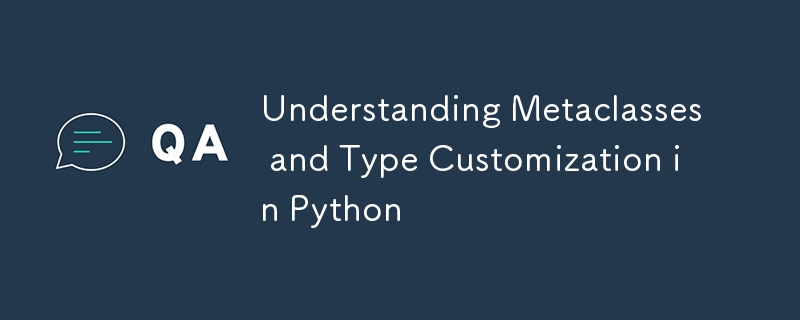
Understanding Metaclasses and Type Customization in Python
Article Introduction:A metaclass is a "class that creates a class", and its core lies in interfering with the class creation process by inheriting the type and overwriting the __new__ or __init__ methods. 1. Metaclasses allow modification of behavior when class generation, such as adding properties, checking method naming, etc.; 2. Custom metaclasses are usually implemented by rewriting __new__, such as forcing the class to contain specific methods; 3. Common uses include ORM frameworks, interface verification, automatic registration of subclasses, etc.; 4. When using it, you need to pay attention to avoid overuse, ensuring readability, debugging complexity, and conflicts in multiple inheritance.
2025-07-07
comment 0
479



















